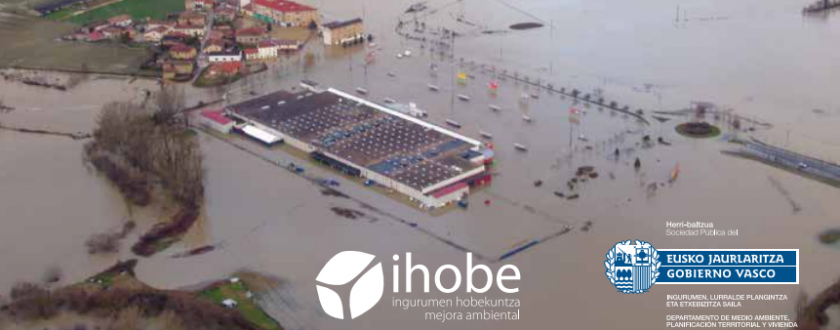Incorporating the climate change variable into land planning instruments: Revising Land Planning Directives
Description of the case study
This is a mature land planning system from the BAC, which provides the opportunity to incorporate operational actions against the change that can allow action to begin taking place on the basis of scientific knowledge and responsibility.
On a local scale, municipal participation and awareness-raising is growing among international initiatives such as the Global Covenant of Mayors for Climate & Energy. The Basque Government materialises its climate change efforts with the KLIMA 2050-Basque Country Climate Change Strategy. In 2019, the Basque Government also joined political, social, and academic institutions from around the world with a formal climate emergency declaration.
Land planning has a direct effect on local resilience through its regulatory connection to municipal urban planning. Integrating climate change adaptation on a local scale is key in Municipal Sustainability Plans and General Plans for Urban Planning with measures meant to minimise adverse impacts and strengthen the ability to respond.
Properly defining adaptation measures involves having relevant, official information on future scenarios, impacts, vulnerability, and risks, which allows decisions on planning and management to be made, and adaptation measures to be designed, for example, as well as limitations to certain uses based on risk, natural solutions or infrastructure planning, urban solutions, and more resilient architecture, etc.
Incorporating the climate variable into sectoral policies through different Regional Sector Plans.
Transferring local scientific climate knowledge produced to other disciplines involved in urban and land planning.
Incorporating climate change adaptation into Basque Country land planning instruments.
» Reviewing the Land Planning Directives approved by Decree 128/2019, dated 30 July, which incorporate an integrating approach to the climate change phenomenon, considering the regional-specific climate scenarios and dedicating a specific chapter to addressing climate change as a cross-cutting issue, among other aspects.
» Reviewing the Bilbao Metropolitan Plot Development Plan, which is a review process that is in the initial approval phase. Adaptation and climate change are included in its Preliminary Report as cross-cutting aspects with usage regulation and land planning implications.
» Reviewing the Bilbao General Plan for Urban Zoning, which is in the initial approval phase of the review process, which strengthens the climate change dimension with a proposal of urbanisation and building recommendations.
Climate change is a new aspect when compared to the BAC’s 1997 Land Planning Directives. These are key aspects in terms of considering adaptation in Land Planning Directives:
» Considering climate change projections and scenarios in the Basque Country, together with socio-economic, demographic, and territorial scenarios.
» Incorporating climate risks as factors conditioning the physical environment, on the same level as other conditions associated with natural hazards.
» Including climate change adaptation through a thematic impact and vulnerability map.
» Requiring the incorporation of climate perspectives into the integrated land planning Territorial Plot Development Plans, on a supra-municipal level, and in sector land planning Territorial Plot Development Plans.
» Promoting green infrastructure, natural solutions, and climate change adaptation measures as mechanisms for regenerating ecosystems and maintaining and improving regional resilience.
The case is developed and implemented as a climate change adaptation measure into various land planning instruments, reviewing Basque Country Land Planning Directives, Bilbao Metropolitan Plot Development Plan, and Bilbao's General Plan for Urban Zoning.
Ihobe, TECNALIA Research & Innovation
Additional Information
The Basque Government Department of Transportation, Land Planning, and Housing, the Provincial Council of Bizkaia, the Bilbao City Council
• Participating with land planning instrument promoting agents through design.
• Having instruments such as climate information cartography available.
• Municipal-scale climate information on key impacts: heatwaves, sea level increases, floods, droughts in the primary sector.
• Urban and territorial planning instrument review processes are quite long.
The economic losses derived from the increased frequency of extreme weather events are increasing. In the EU, these losses alone already represent an average of more than 12 billion euros per year. Conservative estimations show that exposing the EU’s current economy to a global warming of 3°C over pre-industrial levels would lead to annual losses of at least 170 billion euros. Climate change does not only affect the economy, it also affects the health and well-being of Europeans. The co-benefits of adaptation measures, such as implementing nature-based solutions, are multiple in aspects such as health and social cohesion, among others.
The review of the Land Planning Directives provides the rest of the urban and land planning instruments. The project has been developed within the framework of IHOBE's KLIMATEK I+B+G Programme, which supports the realisation of R&D projects that innovate and demonstrate climate change adaptation.
2018 -2019 (1 year - completed)
Reference information
PYRENEAN CLIMATE CHANGE OBSERVATORY
Avenida Nuestra Señora de la Victoria, 8
22.700 - Jaca
Huesca - España
+34 974 36 31 00
info_opcc@ctp.org





